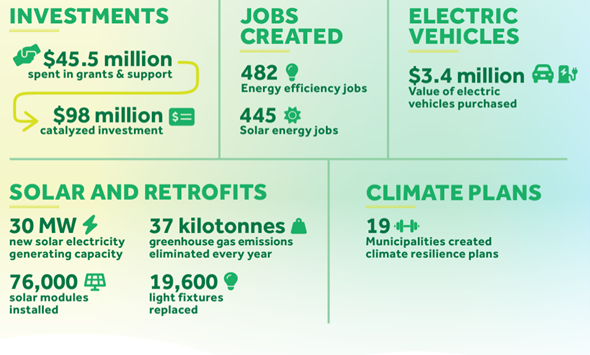How Alberta Municipalities Are Taking the Lead on Climate Action
The pace of climate action within municipalities is increasing across Alberta, but the momentum and associated support must continue. Calvin Lechelt, Program Manager, Sustainability Services at Alberta Municipalities, discusses how local government councils and administrations require continued education and support to help compound and build upon the existing successes.
Municipalities are vital players in efforts to mitigate climate change. As the order of government closest to the people, municipal actions are often more recognizable and impactful to the average Canadian citizen. The Federation of Canadian Municipalities found that municipalities in Canada influence 50% of Canada’s emissions via the municipality’s own corporate emissions and indirect emissions through municipal planning, transportation decisions, land use regulations, and other policies. Whether a municipality is developing an internal energy management plan or enabling residents to retrofit their homes through local Clean Energy Improvement Programs (CEIP), there is no shortage of strategies to reduce emissions and energy costs. Although there are plenty of climate action options, municipalities require support like grant funding, access to financing, additional staff capacity, technical support, education opportunities, and peer networks to make significant emission reductions.
Local Climate Action in Alberta
In Alberta, impactful climate actions are happening at the local level. Municipalities in Alberta have recognized the opportunity to show leadership in climate action while leveraging support programs offered through the Municipal Climate Change Action Centre. The Municipal Climate Change Action Centre (Action Centre) is a unique partnership between Alberta Municipalities, the Rural Municipalities of Alberta, and its primary funder, the Government of Alberta. The mandate of the Action Centre is to deliver funding, capacity-building support, education, and technical expertise to help municipalities in Alberta act on climate change. Since 2009, 55% of municipal governments in Alberta have worked with the Action Centre on nearly 1,000 projects to install solar photovoltaic systems, increase the energy efficiency of municipal facilities, electrify their vehicle fleets to electric vehicles, build internal energy management capacity and more. Due in part to participants’ use of Action Centre programs, Alberta has ten municipalities with net zero electricity fueling their operations, growing electric vehicle fleets, more energy-efficient arenas, and enhanced energy management capacity.

Values Driving Climate Choices
Alberta is a diverse province, and we see a diverse set of values and reasons for taking climate action at the local level. For many municipalities engaged in retrofitting their facilities, cost savings and attractive paybacks are often the most desired outcome of climate action projects. Municipal councils and administrations in Alberta often place cost-savings ahead of environmental benefits like emission reductions as they aim to be good financial stewards of municipal tax dollars. Measures for improved health and safety can also pair with climate action. For example, 29 municipalities received support from the Action Centre to invest in electric ice resurfacers that eliminate indoor exhaust and create healthier and safer arenas. Local governments are even seeing economic development and tourism benefits by supporting the build-out of Alberta’s electric vehicle (EV) charging network to encourage EV drivers to stop in their communities to have lunch, visit a museum, or do some shopping and support local businesses while their vehicle charges. Regardless of the values driving the decision, climate action projects at the community level have an array of benefits.
“Measures for improved health and safety can also pair with climate action”
Calvin Lechelt
Continued Supports and Capacity
The Action Centre recognizes that small and medium-sized municipalities have strained financial resources, limited staff capacity, and a need for energy education initiatives and can meaningfully benefit from flexible, streamlined, and locally delivered climate action programs. To provide fulsome support to local governments, the Action Centre models our programs to check as many of these boxes as possible. The most transformative program that filled these local needs was the Municipal Energy Manager (MEM) Program. The MEM Program provided funding to 37 communities to hire dedicated in-house energy managers to measure energy use, build a greenhouse gas emission inventory, identify emission reduction projects, and manage those projects to completion. Along the way, each energy manager received coaching support, tools, templates, technical training and more to help them reach the goal of reducing corporate emissions by 5% below 2019 levels over their two-year term. Most participating municipalities dramatically exceeded this target with an average emissions reduction of nearly 10%. Several communities achieved up to 20% reductions below 2019 in a two-year term and several hundred thousand dollars in annual cost savings. The MEM Program showcases how action can be accelerated when a diverse array of education, technical, capacity, and financial support come together.

Summary
Although the pace of climate action within municipalities is increasing across Alberta, the momentum and associated support must continue. Local government councils and administrations require continued education, local capacity, technical assistance, and financial support to help compound and build upon the existing successes. With a significant influence over emissions, we need climate-engaged municipal governments to meet Canada’s net-zero targets.














